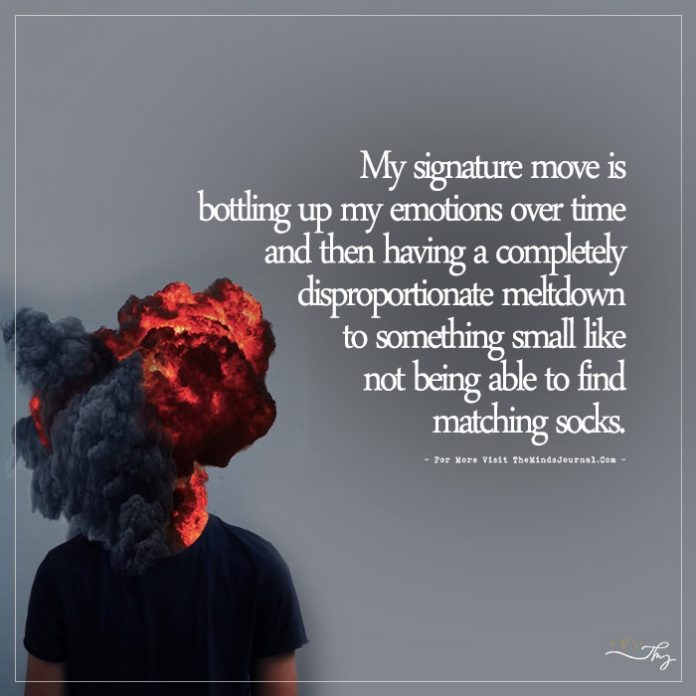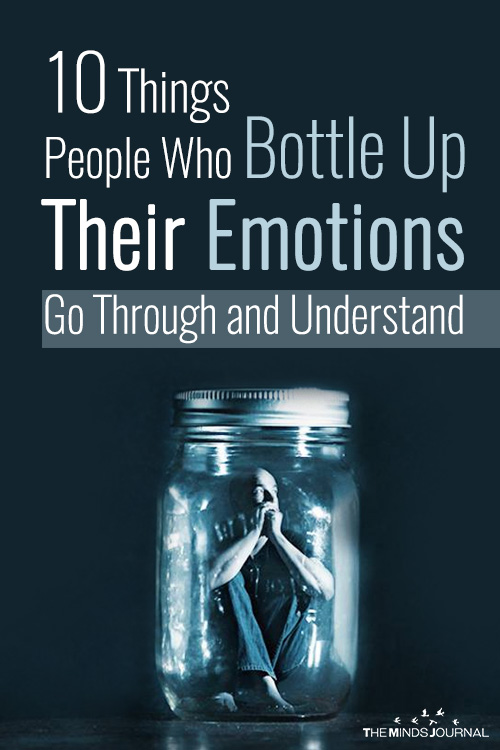“We try so hard to hide everything we’re really feeling from those who probably need to know our true feelings the most. People try to bottle up their emotions as if it’s somehow wrong to have natural reactions to life.” – Unknown
There are people who like to live their life as an open book. Expressing their thoughts as it comes without worrying about the consequences.
This type of people hold no grudges and speak their mind and heart out, they believe in letting it out, and this sort of makes their life easier and also harder at times when the winds are not blowing in their favor.
Then there are people who like to keep things within them. They fear letting out their emotions and feelings may make them vulnerable and also often it might hurt the people around them. These are people who bottle their emotions.
No matter what the reason is but suppressing your emotions can have an adverse effect on your mental and emotional health.
Here Are 10 Things People Who Bottle Up Their Emotions Understand
1. Your anger is dangerous.
One should avoid bottling up anger. Anger, when suppressed for long, can be really dangerous. If left unchecked for a long time it builds up and when it explodes it explodes like a volcano and the problem is it may end up erupting at the wrong person at the wrong time.
2. You build huge walls around you.
You are insecure about letting your emotions out to others and being vulnerable that you have built huge walls around you to keep people away and every time someone tries to get past that wall you shut them out or even lash them. In this process, you often end off cutting people who genuinely care for you.
Related: Understanding your Emotional Command Systems
3. Your anxiety is amplified.
Anxiety is a real mental health issue and it’s about time we address it for what it is. People who bottle up their emotions can’t also share the struggle they face due to their anxiety, thereby making them more anxious and more prone to not opening up.
This cycle continues as you feel anxious when you don’t open up to people and you cannot open up to people because you are way too anxious. It’s truly a vicious cycle.
4. You struggle to start or keep a conversation.
You get so used to the idea of keeping things to yourself that you end up doing it with even the basic conversation. You need to ditch this idea and speak your mind whenever you feel like it and add to any conversation.
5. You’re not at peace inside.
There is a constant argument going on in your head. You do share your thoughts with someone after all- yourself. You need to find an outlet for all the dialogues going inside your head. You cannot keep over-analyzing everything and ruining things for yourself.

6. You let yourself fall prey to toxic people.
You know it when people treat you ill, use you, and walk over you but somehow you manage to never confront them or back off. You just bottle up everything and end up quietly talking all the rudeness, and abuses.
7. You pick up other’s negative feelings.
There is certain empathy in people who bottle up their feelings. They pick up the feelings of people around them and, most of the time the negative feelings thereby adding up to their suffering.
8. You live in survival mode.
Putting your feelings out makes you feel vulnerable and all you want to do is avoid falling prey to the scavengers out there who are waiting to feed on your emotions and insecurities. The idea of bottling up your emotions comes from the survival instinct to escape the narcissist.
Related: Why The Strongest Women Often Feel So Broken Inside
9. The bottled emotions get overwhelming.
You can bottle up only so much. When unchecked for long, the emotions gain critical mass. There will be a time when you reach your breaking point and in those moments even the simplest emotions can cause a lot of pain to you.
10. You’re afraid to cry.
You’re afraid to start crying because you know once you start, you won’t be able to stop. Crying, on the other hand, is a great way to let your pain out.
You who have been hiding all of your emotions until this point and know that if you start once, the façade of you being so strong and happy will be gone and you cannot really stop unless all of it is out.










Leave a Reply
You must be logged in to post a comment.